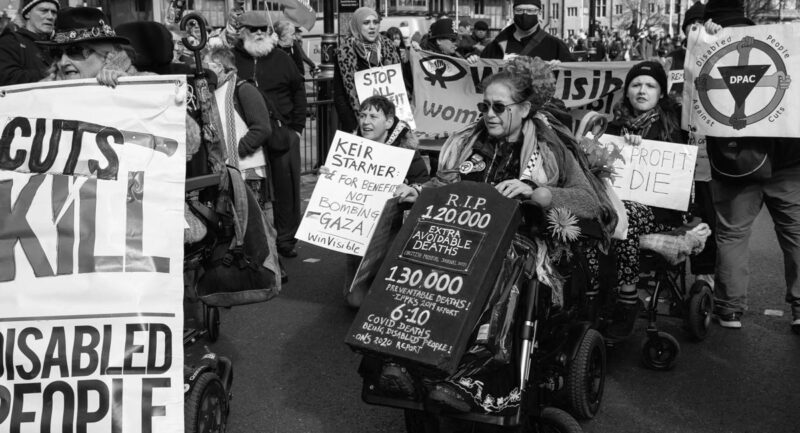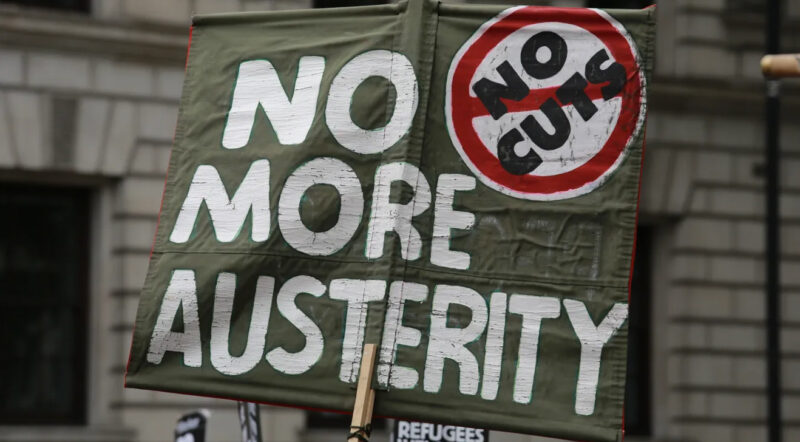Stop the pensions sell out!
 A nightmare before Christmas – Jeremy Dewar reports on the disgraceful attempt by the TUC and big union leaders to accept a deal on pensions that looks almost identical to the one decisively rejected by millions last month.
A nightmare before Christmas – Jeremy Dewar reports on the disgraceful attempt by the TUC and big union leaders to accept a deal on pensions that looks almost identical to the one decisively rejected by millions last month.
Yesterday evening, TUC General Secretary Brendan Barber stood on the steps of Congress House and announced, “We have reached a stage where the emphasis in most cases is in giving active consideration to the new proposals that have emerged rather than considering the prospect of further industrial action.”
The “new proposals” have been slow to emerge from a hectic few days of talks, but it is now clear that they are in essence not new, but the same proposals that were rejected by over 2 million public sector workers who stopped work on 30 November, the single biggest day of strike action since the 1920s.
• Workers will have to pay more in contributions, about 50% more or 3% of their gross pay.
• Workers will have to work longer before they can retire, at 67 for those under 51 years old and 68 from those under 34.
• Workers will get less with pensions pegged to the lower CPI rate of inflation and based on career average salaries (this will particularly hit women hardest)
On the eve of the strike, Treasury minister Danny Alexander tweaked this by ever so slightly increasing the accrual rate (from 1/85th to 1/80th – a rise that is drowned out by the switch to career average salary anyway) and removing those within 10 years of retirement from the reforms. The same leaders, who ridiculed this offer back in November (with 2.6 million strikers breathing down their necks) as too little too late, now seem to think it’s enough to settle.
To now turn around and say more or less the same package, with no extra money forms the basis for a deal is a kick in the teeth for millions of hard working people, who provide much needed public services, most of them for quite low pay and in departments facing historic cuts. It comes on top of a two year pay freeze and a further two years of pay “rises” limited to just 1 per cent, way below the increase in the cost of living.
Worst of all, this has nothing to do with the union leaders being forced to make concessions because they have run out of campaigning options. On the contrary, the TUC and all the union leaders know they could call further strikes, which would threaten the government’s whole austerity agenda. In fact the only reason why Barber has pushed this deal is because he fears the threat that future strikes would bring not only to the government but to his own position as a bureaucratic trade union leader.
A mess of pottage
What is on offer differs scheme from scheme but in every case gives a few crumbs of comfort today in return for accepting exactly the same package a few years down the line. Barber, Dave Prentis and co. resemble Esau, who sold his birthright for a “mess of pottage” – a bowl of soup – simply to satisfy an immediate craving.
For healthworkers, the largest group in the public sector, the only new concession is that half a million workers earning between £15,000 and £26,557 will not have to pay the extra contributions for one year. But those earning more – like junior doctors – will make up the difference. While the BMA is livid, this has been enough to get Unison, GMB and possibly also Unite negotiators to sign up.
Local government union officials – the same big three monoliths – have also swallowed a delay in starting the crippling hike in contributions, this time for two years, i.e. April 2014. But in return the new career average scheme could be replace the current, more generous final salary scheme a year earlier than originally planned, also in 2014. As with the NHS, there appears to be no new money on the table.
And here, more or less, the new proposals appear to end. For all the scurrying back and forth from meeting to meeting from 15 to 19 December, little has been achieved. The PCS, UCU, NUT and NASUWT have achieved nothing for the civil servants, lecturers and teachers, which explains why their leaders have by and large rejected – or “not accepted” – the proposals so praised by Barber and Prentis.
That the smaller civil service and teaching unions, Prospect, ATL, NAHT, etc. have welcomed them says more about these so-called unions than it does about the “new atmosphere in negotiations” as Barber called it. In fact, the biggest factor in forcing their hands is the threat by Francis Maude and Danny Alexander to withdraw their concessions first made on the eve of the big strike, if the deals are not accepted by the end of the year. The government hardened its stance, and as a result the resolve of leaders of unions with millions of members crumbled.
Not so much a mess of pottage the union leaders want us to buy as “another fine mess they’ve got us into”.
Where next?
At short notice, around 150 trade unionists attended the lobby of the TUC called by Right to Work and the National Shop Stewards Network. Michael Bradley of the Socialist Workers Party called for a two or three day strike in the new year, while Rob Williams of the Socialist Party thought escalation could mean bringing more unions out on a bigger one day strike on 25 January.
But another day of action on 25 January is not escalation, it is repetition. The call for two days of strikes in the new year is better, but in the face of this sell out it can only break through the deadlock if it is organised from below. What is needed is a clear action plan to build a new culture in the unions that can deliver the action we need, with the union leaders if possible and, in this case, against them where necessary.
We must go beyond calling on our unions and the TUC to name the date for another day of action or a two or three day strike. We must organise the rank and file to threaten to defy their union leaders, should they stall for more talks or sell out. Let Prentis, Paul Kenny and Len McCluskey know that they will lose control. This alone will force them to go further than they wish to.
With regard to the talks and offers made, we say:
• Reject the deals – the only acceptable deal is the full withdrawal of the reforms.
• No to sector-by-sector negotiations – we all settle or no one settles.
• Membership control over all talks – All negotiations to be conducted live in full view of the membership, not secretly, for daily reports and rank and file representatives at the table.
• No settlement without workplace ballots where both sides of the argument are heard in full debate – and no delay in putting any offer deemed acceptable to the elected national executives and then the members.
• Members must have the right not only to accept or reject the deals but also on what action to take next: resume negotiations, further coordinated strikes or escalation up to and including a general strike.
To mobilise for action to defeat the reforms and go on the offensive against the government, we say:
• Form or re-invigorate joint strike committees in every town and city, sending delegates to a national coordinating committee to lead the struggle.
• Hold mass meetings of members to discuss sell out and commit them to take solidarity action if any union strikes against the government (e.g. PCS, NUT).
• For a 2-3 day strike in January, escalating into an indefinite strike if the government doesn’t back down – all out, stay out, till all win.
• Link up with other public sector unions, like the RMT, FBU and CWU, all of which face austerity measures and attacks on pensions. Link up with private sector workers in struggle, like the construction site electricians and Unilever workers. Link up with the broader anticuts movement: Occupy London, UK Uncut, local anticuts groups. Turn the joint strike committees into councils of action.
Past disputes over public sector pay and the debacle in the British Airways dispute shows that these traitors will sit on their hands until they demoralise the members into accepting the same offer they fought against in the first place.
But if we can mount solidarity strikes across the unions, across the sectors and across the country in support of the PCS or NUT’s next day of action, if we can build joint strike committees in every town and city to achieve this, and if we can link these up into a national strike leadership and join them with other union groups in struggle, like the electricians and Unilever workers, then we can kick off 2012 with an almighty class struggle that could rock this government and smash the pensions reforms.
Important meeting in the new year
PCS Left Unity has called an “organising conference” on 7 January in London to discuss the next steps and invited activists from other unions to come along. We need to get as many trade unionists there as possible and ensure it debates and votes on clear resolutions mapping out an action programme, like the one above. But it is far from certain that it will do so – for a start, the SP, the leading faction in Left Unity, fights shy of defying the anti-union laws and believes indefinite strikes are out of the question.
They may be overwhelmed by the numbers and militancy of the participants – let’s hope so – but the SP leaders have a record of manipulating conferences. For this reason, Workers Power, as well as taking our proposals into the 7th January conference, are actively seeking allies to call a rank and file conference that can break free of the ties to the left bureaucratic leaders that have held back initiatives like Right To Work, Unite the Resistance and the National Shop Stewards Committee.
Meeting is at Friends Meeting House, 7th January 11-4, all public sector trade unionists welcome






